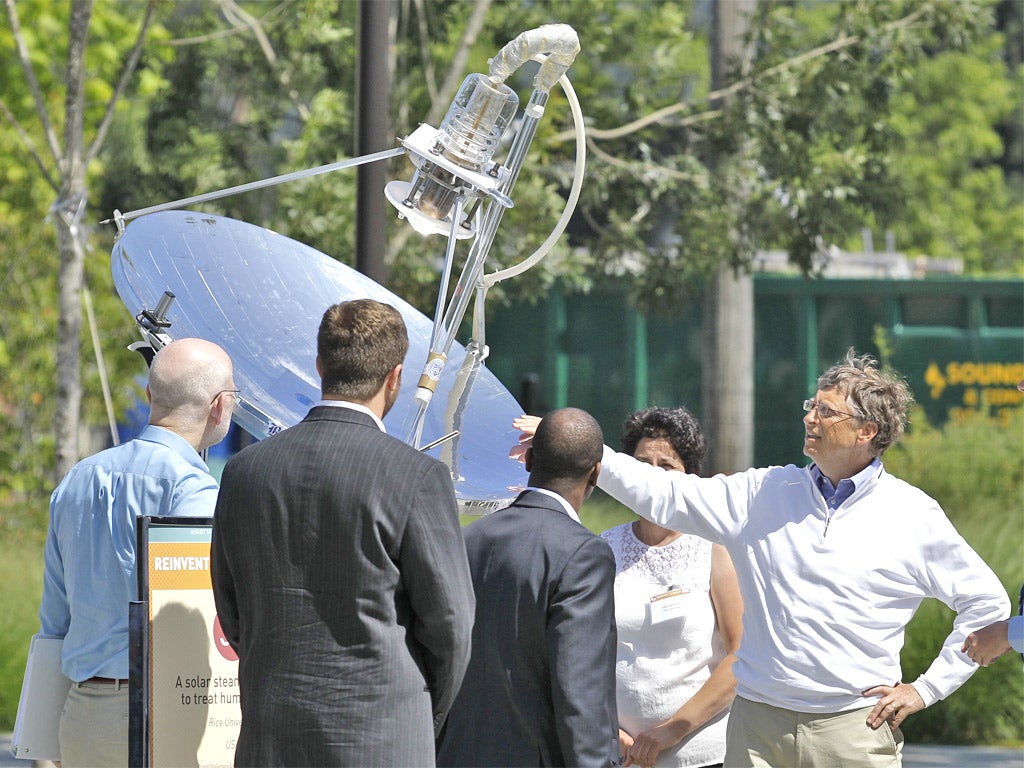First he reinvented computers, now Bill Gates wants to reinvent the toilet
The world's richest man has set himself a new challenge – to improve sanitation for the poor

More than 230 years after a Scottish watchmaker called Alexander Cummings patented the flush toilet, Bill Gates yesterday handed $100,000 to a team from the California Institute of Technology who believe their invention goes one better.
Flush toilets, Gates wrote in a recent blog, "are irrelevant, impractical and impossible for 40 per cent of the global population, because they often don't have access to water, sewers, electricity and sewage treatment systems".
A toilet in the developing world is often no more than a hole in the ground, otherwise known as a pit latrine. When there is no practical way of emptying it, its users must dig another, or defecate outdoors.
The world's richest man, who is also the planet's most generous philanthropist, has set inventors the challenge of developing a lavatory that will work in the most deprived and impoverished environments. To qualify, the prototypes must operate without running water, electricity or a septic system; must not discharge pollutants; and cost no more than five US cents a day to run. If they also provide a bonus in energy or other resources, even better.
The challenge has ignited a volcano of ingenuity. Caltech's winning entry is based on a solar-powered electrochemical reactor which breaks down faeces and urine into hydrogen – which in turn becomes a back-up source of energy.
Second prize went to Loughborough University's effort, in which the waste is turned into biological charcoal which when burned produces the energy to power the system. It also recovers water and salts from the faeces and urine.
Mr Gates was confronted with the way the other half lives on a visit to Durban in South Africa in 2009 when he learned all about the pit latrine, and its variant the VIP latrine – "Ventilated Improved Pit Latrine" – which has an airpipe to carry away the fumes.
The new funding announced yesterday brought his commitment to improving water, sanitation and hygiene issues to $370m. His reason for making this huge investment is simple: saving millions of lives. Pit latrines and outdoor defecation are not only offensive to the eyes, nose and dignity of the users but a dire threat to their health.
"Worldwide," Mr Gates claims, "there are 2.5 billion people without access to safe sanitation. They include 1 billion people who defecate in the open, and more than 1 billion others who must use pit latrines. Beyond a question of human dignity, this lack of access also endangers people's lives, creates an economic and health burden for poor communities, and hurts the environment." Diarrhoeal diseases, he said, killed more than 1.5 million children every year.
The prototype toilets were presented at the Reinvent the Toilet Fair in Seattle this week, and tested using many gallons of "fake poop" made from soybeans and rice. If some of the entries looked too dainty and complex to survive long in a shanty town, others took a more down-to-earth approach, including one from the London School of Hygiene and Tropical Medicine which uses black soldier fly larvae to digest the waste, turning it into animal feed.
Gates may be aiming his putative new loo at the Developing World, but he is far too canny not to see its potential for the west. "In an era where water is becoming increasingly precious," he says, "many of these innovations will not only revolutionise sanitation in the developing world, but also help transform our dependence on traditional flush toilets in wealthy nations."
Flushed with success: The winners
The solar-powered loo
California Institute of Technology won the £64,000 prize for its work on a toilet powered by solar energy. It is designed to break down faeces and urine into hydrogen gas, which can be stored in fuel cells to provide back-up power to use at night or in low-sunlight conditions. Water used to flush the toilet is also recycled.
The fuel-producing lavatory
Second place, and a £38,400 grant, went to the team at UK's Loughborough University, which designed a clever lavatory that transforms human waste into biological charcoal and minerals. These can then be used as fuel or a form of conditioner for soil. It also produces clean water.
The santising WC
The futuristic loo developed by the team at the University of Toronto in Canada, which took the third prize of £25,600, sanitises faeces and urine and is also designed to recover resources and clean, reusable water.
Join our commenting forum
Join thought-provoking conversations, follow other Independent readers and see their replies
Comments